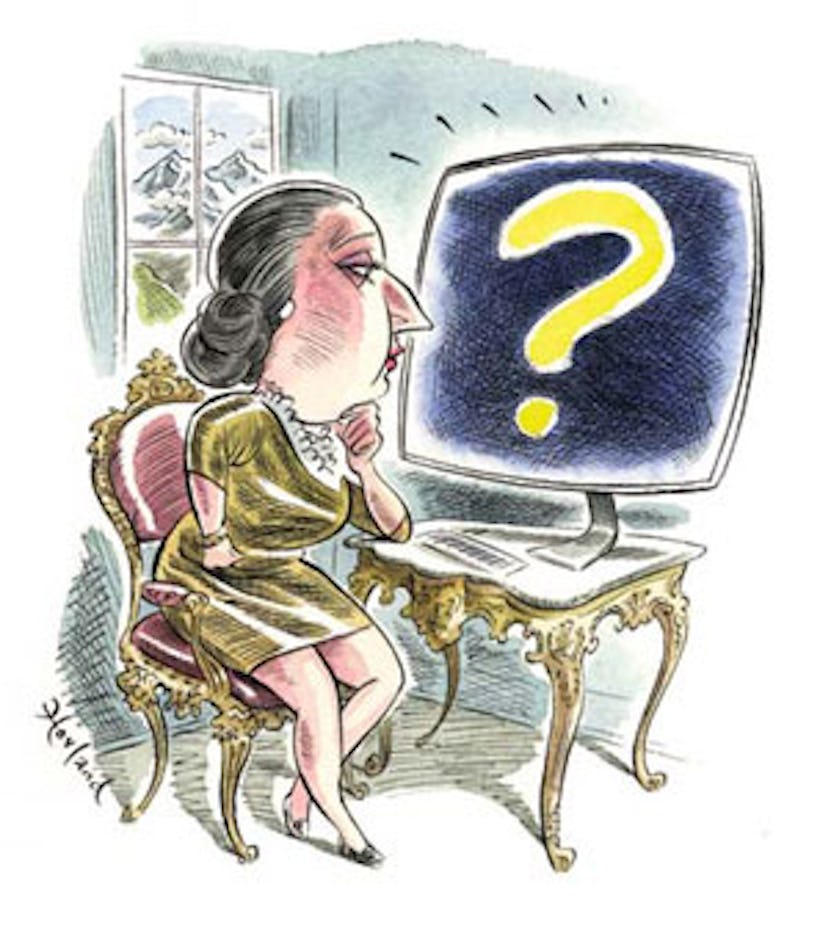Last Laugh: Digital Disturbance
Luxury may have been given a bad name in this recession, but, the Countess argues, quality will never go out of style.

My Austrian cousin always insists I have to get out of the 19th century.
“Well, how do I do that?” I ask her as we sit in my schloss staring at the snow-covered Alps, the pine trees sticking out like green pipe cleaners.
“In the future, everything will be done by computer. The computer will tell you all you need to do and how to do it.”
“That isn’t a bad idea,” I reply. “But what do I want my computer to tell me? That’s the problem.…”
My cousin was no help. So now I’m trying to figure out what I want my computer to tell me.
For instance, I want it to tell me about being a snob and being politically incorrect. The keyboard just froze. So much for that instruction.
Now my computer and I are fighting over the fact that I think keeping tabs on Hollywood stars—their comings and goings, what they had for breakfast—is as exciting as watching Microsoft Windows load. Are we really that obsessed with them?
My Escape button has locked and there is a loud brrrr coming from the hard drive.
There are wonderful things, though. I can sit in Austria, log on to Google Maps and see the Manhattan street where my pied-à-terre is located. So, tell me, computer, why does New York need such a big cleanup? And I’m not just talking about Wall Street. The live pictures of my neighborhood show the sidewalks are a mess. The computer wasn’t seeing very well when it predicted a landslide victory for Mayor Bloomberg, was it? But now that he has won a third term, he should get on the stick and start sweeping.
Closer to where I’m sitting, why is it that the Swiss raised such a fuss about Megan Beyer, wife of the American ambassador to Switzerland, planting a victory garden à la Michelle Obama at the ambassador’s residence in Bern? She was inspired after eating greens from the Obamas’ garden at a White House luncheon (although news of the garden was all over the Web). In response, the Swiss, who didn’t want the Beyers in the first place, sent around a carload of all the cheeses in Switzerland (joke).
Scanning the European media to find out what they think about our famous president, my computer informs me that many of them—though this is not universal—think he’s a Big D (meaning big disappointment) so far.
But isn’t it typical of the Europeans to complain about everything in America? And when they do, my response is that America is still filled with the most generous, friendliest people on this planet. And it’s not as though the issues are easy. Afghanistan, for instance, is like a puzzle with 50,000 pieces and no corners.
Unfortunately, our great country has politicians and representatives who talk as if they have a hot baked potato in their mouth. Even the computer can’t keep track of how their politics change by the hour. Taking time to make up one’s mind on big decisions is okay, but after you’ve decided, changing to another policy is a sign of weakness, not compromise. At least France’s Nicolas Sarkozy and Italy’s Silvio Berlusconi stick to their guns. (And then there’s Mrs. Sarkozy, Carla Bruni. I know for a fact that at a recent dinner party the French president and first lady flirted all night and had some amorous bodily contact.)
Speaking of government, my AOL home page tells me of the great advances in the business world and in medicine, which is certainly a business. But there is no mention of where the heart is in business today. After all, isn’t it about the people?
There are plenty of other questions the computer cannot answer—and plenty of ways it makes people lazy. For instance, children now type their thank-you notes rather than handwrite them, rely more on Google than the library and use the computer to do math calculations instead of writing them out.
Oh, but I suppose those are my 19th-century attitudes refusing to be subdued! Sure, the computer is fine, but the problem is everyone is looking for the next new thing—and even the computer can’t tell us what it is. Who wants it anyway? I’d rather have the old next thing.